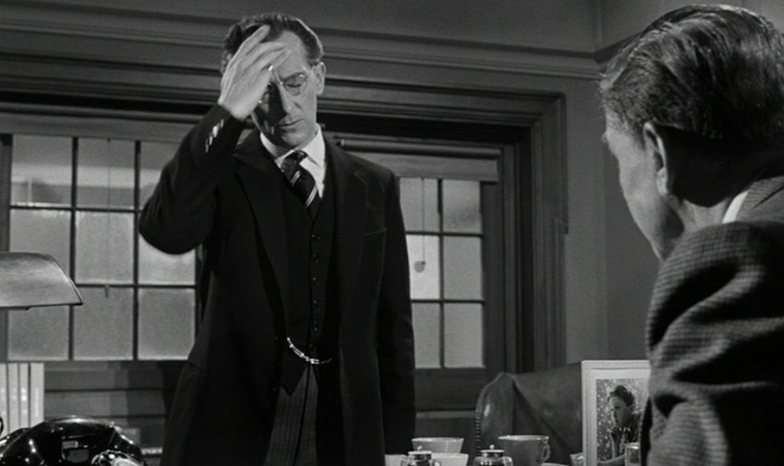
Quentin Lawrence directed Cash On Demand (1961) and a couple of other films for Hammer Studios, making a specialty of thrillers throughout his long career. Cash On Demand benefits tremendously from Lawrence’s sensibilities, elevating the stagey aspects of the source material so that the overall film is tense and character driven. Hammer Studios may be known mostly for their horror content but they produced films across a wide variety of genres. Cash On Demand remains one of Hammer Studios’ greatest films, having gotten better with age, unlike some of their monster movies.
At the heart of the film is Peter Cushing and André Morell’s chemistry. The repartee between these two actors drives the stakes of this heist film, working both as a fountain for exposition and as the platform for a verbal game of cat and mouse. Cushing delivers what’s likely the best performance of his career as an imperious bank manager who comes completely undone by the ordeal by the end of the film. The tension isn’t so much about whether or not André Morell will get away with the bank’s money as it is a matter of how long is it going to be before Peter Cushing snaps.
The arc of Cushing’s character combined with the seasonal setting casts Cash On Demand as a kind of variation on Charles Dickens’ A Christmas Carol. Cushing’s bank manager begins the film as emotionally distant, cold, and uncaring about anything other than the efficiency of his branch. But after an hour with André Morell’s charming yet sinister bank robber, Cushing’s singular priority has become people. The connection to A Christmas Carol is a nice bit of literary texturing that adds some agency to Cash On Demand.
No matter what the genre Hammer Studios isn’t known for taking their time constructing character driven pieces like Cash On Demand. Cash On Demand retains the signature flavor of Hammer’s films of course, it’s just counterbalanced with something other than spectacle. After the initial run of horror films in the late fifties the best and most influential pictures Hammer produced were smaller, quieter films.
